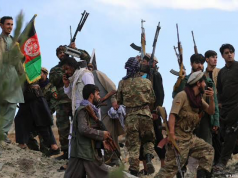
Thousands of Afghans have fled their homes in Helmand province as fierce fighting broke out between government forces and the Taliban erupted after the United States military began withdrawing its remaining troops.
Afghan forces pushed back a string of insurgent attacks on checkpoints across the southern province, where the US military on Sunday handed over a base to government forces as part of its formal pullout that began on 1 May.
Report has it that about 1,000 families have fled their homes to escape the fighting that erupted on the outskirts of Lashkar Gah, the capital of Helmand, and some other parts of the province.
The region’s director for refugees, Sayed Mohammad Ramin, said that the families had taken refuge in Lashkar Gah and had come from areas where fighting was intense in the past two days.
“We will survey their needs tomorrow, but many who still have not found shelter in the city need urgent assistance.”
The defence ministry said that government forces had killed more than 100 Taliban fighters in Helmand in the past 24 hours when the insurgents attacked some checkpoints on the outskirts of Lashkar Gah.
Another 22 al-Qaida fighters from Pakistan were also killed in the fighting, the ministry said.
Officials said the Taliban fighters initially captured some checkpoints but they were retaken by government forces who pushed back the insurgents.
“The enemy has now lost all the areas it had captured and suffered heavy casualties,” Attaullah Afghan, head of the Helmand provincial council.
The Taliban said dozens of Afghan troops were killed in the fighting. Both sides are known to exaggerate casualties inflicted on the other.
UK-based medical care provider Emergency said it is receiving large numbers of “war wounded patients” at its surgical centre in Lashkar Gah due to widespread fighting in the area since 1 May.
It said the hospital received 106 patients, of which 65 had to be admitted.
“These are very difficult days in Lashkar Gah … We have also put beds in the physiotherapy room to accommodate all the injured patients,” Viktor Urosevic, medical coordinator at the hospital, said in a statement issued by Emergency.
Emergency’s Afghanistan coordinator, Marco Puntin, said fighting in Helmand was not an isolated event.
“We have witnessed an escalation of conflict across Afghanistan,” he said.
Fighting was also reported in several other provinces since the US military formally began pulling out its remaining 2,500 troops.
The Pentagon has downplayed the fighting.
“We’ve seen nothing thus far that has affected the drawdown, or had any significant impact on the mission at hand in Afghanistan,” US Department of Defence spokesperson John Kirby said.
Nearly 20 years after US and allied Natotroops invaded Afghanistan and ousted the Taliban government as they pursued al-Qaida after the September 11, 2001 attacks, President Joe Biden ordered in April the final withdrawal today, May 4.
US officials said the military has completed two to six percent of the withdrawal.
“… we have a small favour to ask. Millions are turning to the Guardian for open, independent, quality news every day, and readers in 180 countries around the world now support us financially.
“We believe everyone deserves access to information that’s grounded in science and truth, and analysis rooted in authority and integrity. That’s why we made a different choice: to keep our reporting open for all readers, regardless of where they live or what they can afford to pay. This means more people can be better informed, united, and inspired to take meaningful action.
“In these perilous times, a truth-seeking global news organisation like the Guardian is essential. We have no shareholders or billionaire owner, meaning our journalism is free from commercial and political influence – this makes us different. When it’s never been more important, our independence allows us to fearlessly investigate, challenge and expose those in power.
Source: FP.





